Benefits Of Epsom Salt Foot Soak & How To Use It For The Feet
From treating athlete's foot to reducing inflammation – this salt can do wonders!
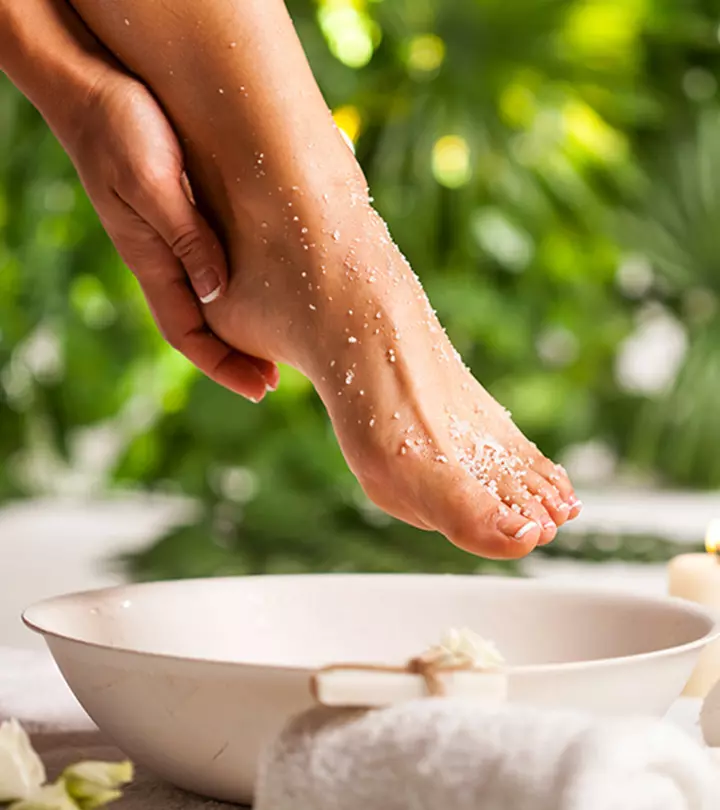
Image: Shutterstock
Epsom salt foot soak is one of the oldest natural remedies to treat multiple ailments like muscle cramps and stress buildup in the foot

. It is also known as magnesium sulfate and is a natural mineral that contains oxygen, sulfur, and magnesium. According to anecdotal evidence, Epsom salt foot soak can help exfoliate dead skin cells, soothe rough skin, and manage several skin issues.
This article discusses the benefits of an Epsom salt soak and how to use it for the feet. Keep reading.
 Fun Fact
Fun FactIn This Article
How To Make A Foot Soak
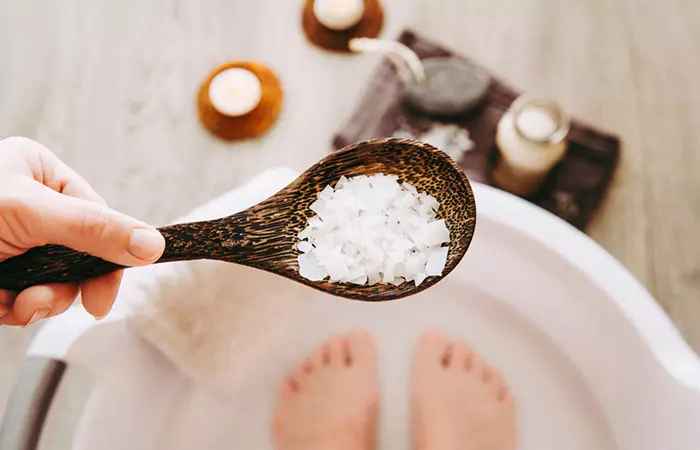
Preparing an Epsom salt foot bath is simple and involves a few basic steps:
Step 1: Collect enough warm water in a bucket so that you can immerse your feet up to your ankles.
Step 2: Ensure that the water is warm but not hot. Your skin should feel comfortable in the water and not burn from the scalding heat.
Step 3: Drop at least a half cup of Epsom salt in the water and mix it well.
Step 4: Dip your feet in the water and let them stay there for at least 30 to 60 minutes.
Step 5: Add a few drops of essential oil to the water for an amazing aromatherapy-like spa treatment.
You can personalize your foot soak by adding lavender oil for a calming effect, a spoonful of baking soda for extra exfoliation, or peppermint oil for a refreshing boost. Tailor the ingredients to suit your needs and enjoy the benefits of your own mini-spa treatment.
 Trivia
TriviaAs per a study, the magnesium in Epsom salt foot soaks may penetrate the outer protective layers of the skin (1). However, there is no scientific evidence to prove that it increases the magnesium levels in the body. The extent of permeability also depends on the salt concentration and the duration you soak your feet in Epsom salt. This offers a host of benefits for the skin and the feet, some of which are listed below.
Key Takeaways
- An Epsom salt foot soak helps treat athlete’s foot and other inflammatory skin conditions, eliminates dead skin cells, and relieves stress.
- If you have dry skin, you should not use this remedy more than twice a week.
- Excessive soaking in Epsom salt may lead to dry and cracked skin.
Benefits Of Epsom Foot Soaks
1. Treat Athlete’s Foot
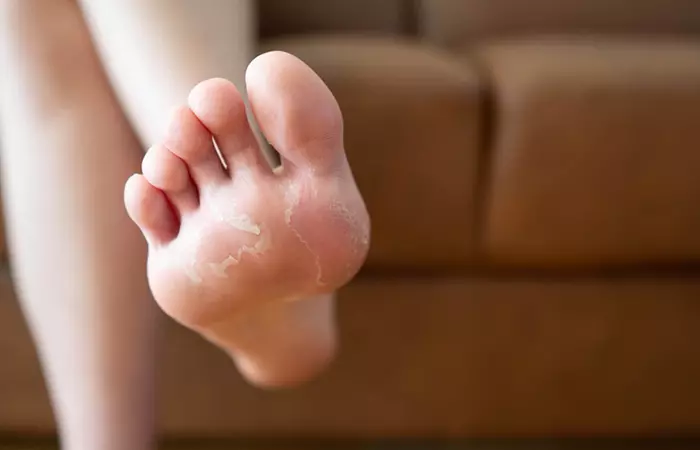
Epsom salt may not kill the fungus, but helps draw out moisture, ultimately making the feet less habitable for the fungus. It can also help treat foot infections and ingrown nails on the toes. If you want to treat athlete’s foot, you can try using an Epsom salt foot soak. However, ensure you discuss with your doctor.
2. Reduce Inflammation

Although there is no substantial evidence to back the claim, the magnesium content in Epsom salt may reduce inflammatory skin conditions. This is why the use of Epsom salt is recommended for gouti A painful form of arthritis that usually affects one joint at a time and is caused by an increase of uric acid in the blood. , arthritis, and muscle pain relief.
A blogger shares their experience using Epsom salt to alleviate foot and ankle pain caused by a leg length discrepancy. Their podiatrist recommended soaking the foot and ankle in Epsom salt and warm water for 20 minutes at night. In the blog, they said, “It’s my first day soaking my feet and ankle in Epsom salt and it feels very nice! Not only does it reduce the swelling, but my feet feel very relaxed, soft, and smooth. It beats taking anti-inflammatory medication (i).”
3. Exfoliate The Skin
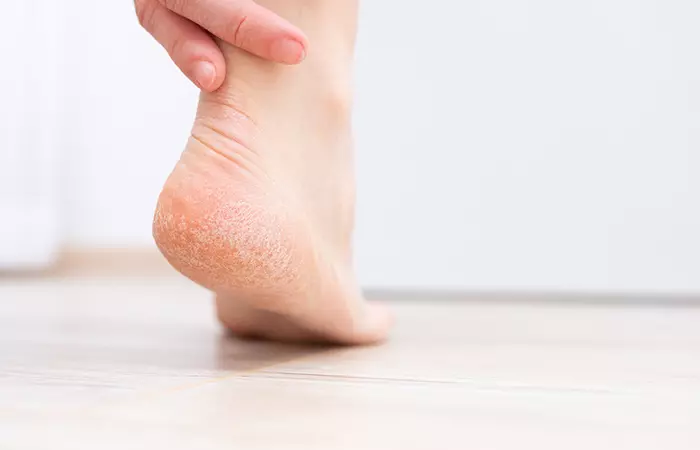
Soaking your feet in Epsom salt helps eliminate the dead skin that accumulates under the feet. This prevents roughness and leaves your feet softer. Epsom salt can also reduce skin infections, which occur due to excessive buildup of dead, flaking skin cells, and thus promotes foot care.
4. Prevent Odor
Among the many uses of Epsom salt for soaking feet is its ability to remove odor. Using a foot soak will help keep your feet clean and free of germs that build up on the skin and contribute to odor.
5. Release Stress
Epsom salts to soak your feet may help improve the circulation of blood. The warm water and minerals of Epsom salt push the blood under the skin, releasing stress and imparting relaxation.
6. Beauty Treatment
You can use Epsom salt as a beauty treatment to pamper yourself. Epsom salts help loosen the dirt sticking on the skin and remove callusesi The hardening or thickening of skin on the hands and feet due to friction and pressure from repeated action. that can make your feet appear less attractive. This is why you should practice self-care, one that leaves you with happy and healthy feet.
You may add other ingredients to your Epsom foot soaks for bonus benefits. Check out the next section to find out the best ingredients to add.
Complementary Epsom Foot Soak Ingredients
Add the following ingredients to your Epsom foot soaks to pamper your feet:
- Apple Cider Vinegar: An ACV and Epsom salt foot soak can have many benefits for your skin. ACV is a natural exfoliant and widely known for its antimicrobial properties (2). This can enhance the exfoliation action of the foot soak while also keeping bacterial and fungal infections at bay.
- Baking Soda: Baking soda has potent antifungal properties (3). It is also known to have odor-neutralizing properties. Combined with Epsom salt, this foot soak can keep your feet clean, relieve strain and swelling, and fight fungal infections and foot odor.
While you dip your feet in these foot soaks and experience their magical effects, it is necessary to follow some precautions while using Epsom salts.
Precautions
- Avoid excessively soaking your feet in Epsom salts as it may result in dry and cracked skin.
- People with dry skin on their feet must not use this bath salt remedy more than twice or thrice a week. Add a layer of moisturizer after soaking your foot in Epsom salt to reduce the impact of dryness. It is best to consult a doctor if you face a recurring condition or extreme foot pain that does not go away even after a few Epsom salt treatments.
- People with diabetes should obtain medical consultation before using Epsom salt as it exposes them to an increased risk of infections. It is recommended to consult a specialist if you experience open sores or prolonged pain in your feet.
The next sections will answer a few questions related to the use of Epsom salt for swollen feet. Read on to learn some of the benefits of Epsom salt.
Does Epsom Salt Help Swollen Feet?
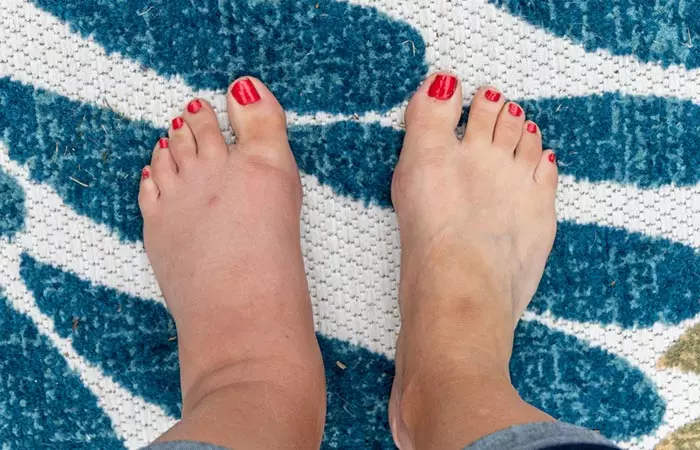
Yes. Although no scientific evidence backs this claim, Epsom salt may help reduce pain and inflammation on the feet by drawing out toxins (4). It can help you feel relaxed and reduce swelling on the feet. However, the remedy may work only when you use a trusted Epsom salt product for this purpose.
How Long Should I Soak My Feet?
You can use Epsom salts for swelling and inflammation but not for more than 30 to 60 minutes at a time. You can soak your feet for this duration even if you pair Epsom salt with other ingredients to make different homemade foot soaks. Thirty minutes is more than enough time to improve foot health without drying out your skin.
Does Epsom Salt Help With Toenail Fungus?
Yes. The effect of Epsom salt on toenail fungus depends on the severity of the infection. However, Epsom salt alone may not be sufficient to treat severe cases of toenail fungus.
Is It Ok To Soak Your Feet In Epsom Salt Every Day?
No. Using it daily may leave the skin dry and cracked. To avoid this, follow this remedy not more than 2-3 times a week.
Does Epsom Salt Help Draw Out Toxins?
Epsom salt is made of magnesium and sulfate, which are thought to stimulate detoxification pathways. However, there is no scientific evidence to support this claim.
Infographic: Top 5 Reasons To Try An Epsom Salt Foot Soak
Epsom salt is a popular ingredient in detox foot baths due to its anti-inflammatory properties. Irrespective of whether it is for self-care, muscle soreness, mild foot pain, or any other discomfort, Epsom salt might be the remedy you are looking for. Check out the infographic below to learn why you should try an Epsom salt foot soak.
Some thing wrong with infographic shortcode. please verify shortcode syntax
More research is needed to confirm the benefits of Epsom salt foot soaks. However, anecdotal data suggests that people feel more relaxed and peaceful after taking a warm Epsom salt bath, have less muscle soreness and aches, and have softer skin. Avoid soaking your feet in Epsom salts for too long, as this can cause dry, cracked skin. Also, remember to consult a doctor if you have a persistent disease or severe foot pain that does not go away after a few Epsom salt treatments.
Frequently Asked Questions
Can Epsom salt foot soaks help with plantar fasciitis?
Epsom salt soaks may help ease some pain and reduce inflammation for those experiencing plantar fasciitis. However, these soaks cannot be used as the sole treatment option. It is best to check in with a healthcare professional for proper treatment solutions for any ongoing or severe discomfort.
Who should not soak feet in Epsom salt?
People with blisters, cuts, callusesi The hardening or thickening of skin on the hands and feet due to friction and pressure from repeated action. , sores, or scabs should not soak their feet in Epsom salt as they may break open, causing further damage and pain due to the salt’s drying effect.
Is Epsom salt antibacterial?
Although Epsom salt has several advantages, further research is required to determine if it has antibacterial properties.
Can I soak my feet in Epsom salt and vinegar?
Yes, you can soak your feet in Epsom salt and vinegar. It may provide a calming effect by relieving stress and pain in your feet.
Illustration: Benefits Of Epsom Salt Foot Soak & How To Use It For The Feet
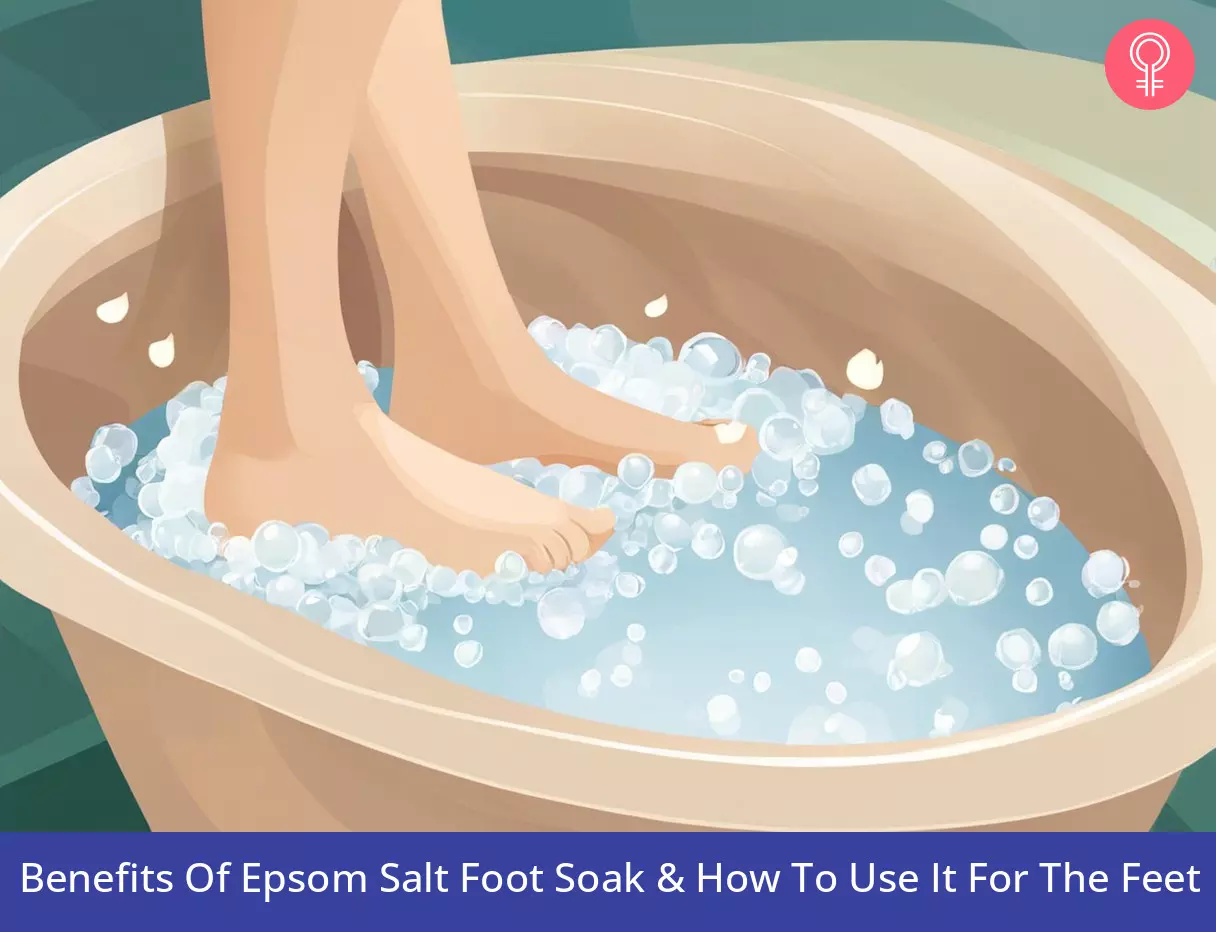
Image: Stable Diffusion/StyleCraze Design Team
Soaking your feet in Epsom salt may help provide relief from inflammation and pain and boost your skin health. Watch the video below to learn the many benefits of this salt foot soak.
Personal Experience: Source
StyleCraze's articles are interwoven with authentic personal narratives that provide depth and resonance to our content. Below are the sources of the personal accounts referenced in this article.
i. Epsom Salt – Reducing Foot & Ankle Painhttps://tmj-tiff.blogspot.com/2012/05/epsom-salt-reducing-ankle-pain.html
References
Articles on StyleCraze are backed by verified information from peer-reviewed and academic research papers, reputed organizations, research institutions, and medical associations to ensure accuracy and relevance. Read our editorial policy to learn more.
- Myth or Reality—Transdermal Magnesium?
https://www.ncbi.nlm.nih.gov/pmc/articles/PMC5579607/ - Antimicrobial Activity of Apple Cider Vinegar Against Escherichia coli, Staphylococcus aureus and Candida albicans; Downregulating Cytokine and Microbial Protein Expression
https://www.ncbi.nlm.nih.gov/pmc/articles/PMC5788933/ - Antifungal Activity of Sodium Bicarbonate Against Fungal Agents Causing Superficial Infections
https://pubmed.ncbi.nlm.nih.gov/22991095/ - The Use Of Epsom Salts, Historically Considered
https://www.ncbi.nlm.nih.gov/pmc/articles/PMC1584988/
Read full bio of Dr. Archna Agrawal
Read full bio of Arshiya Syeda
Read full bio of Ramona Sinha
Read full bio of Shiboli Chakraborti





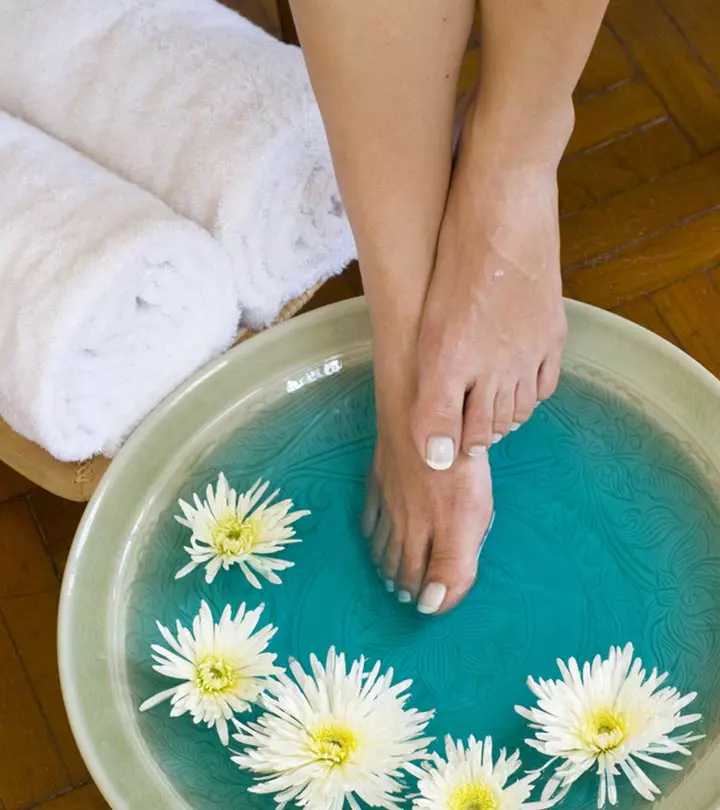

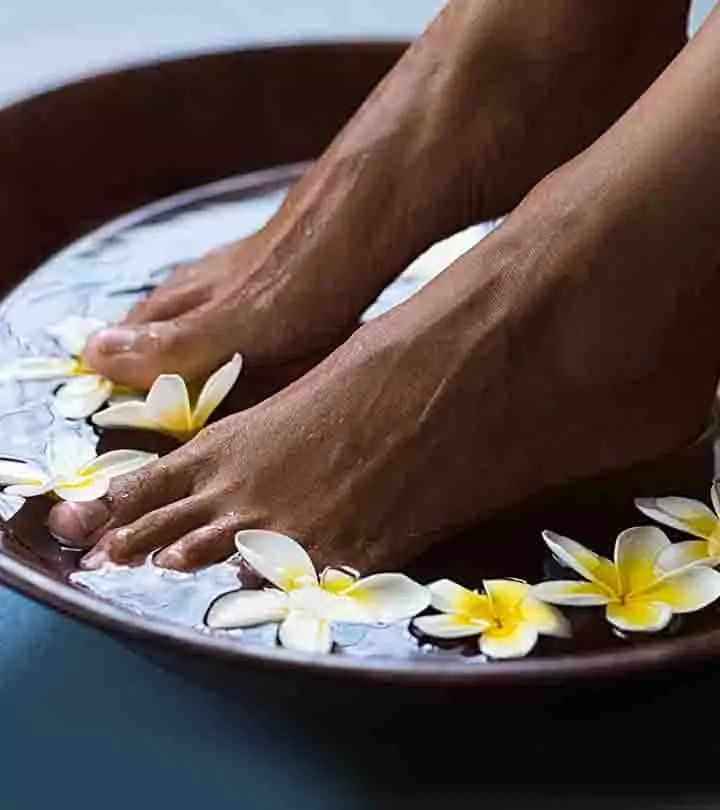
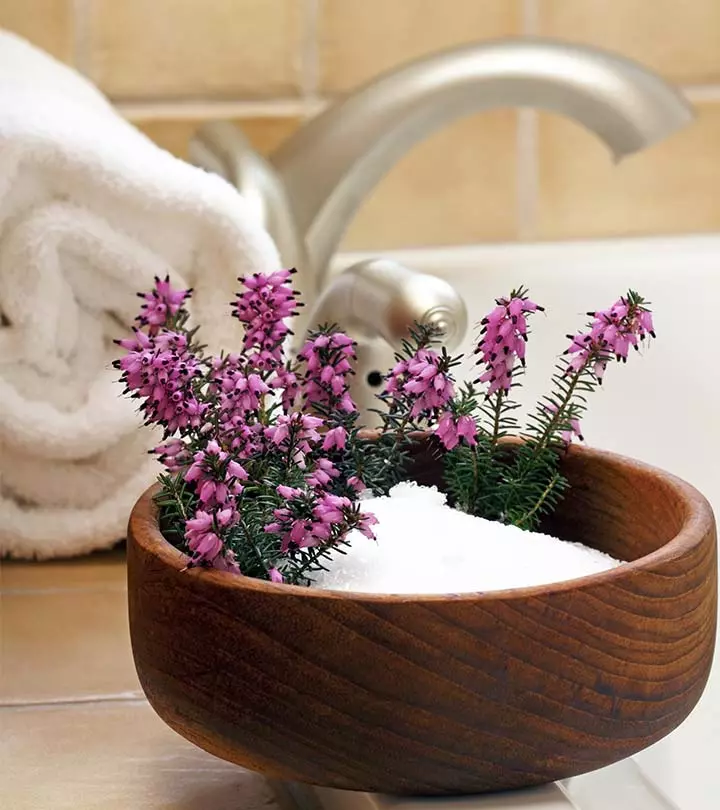
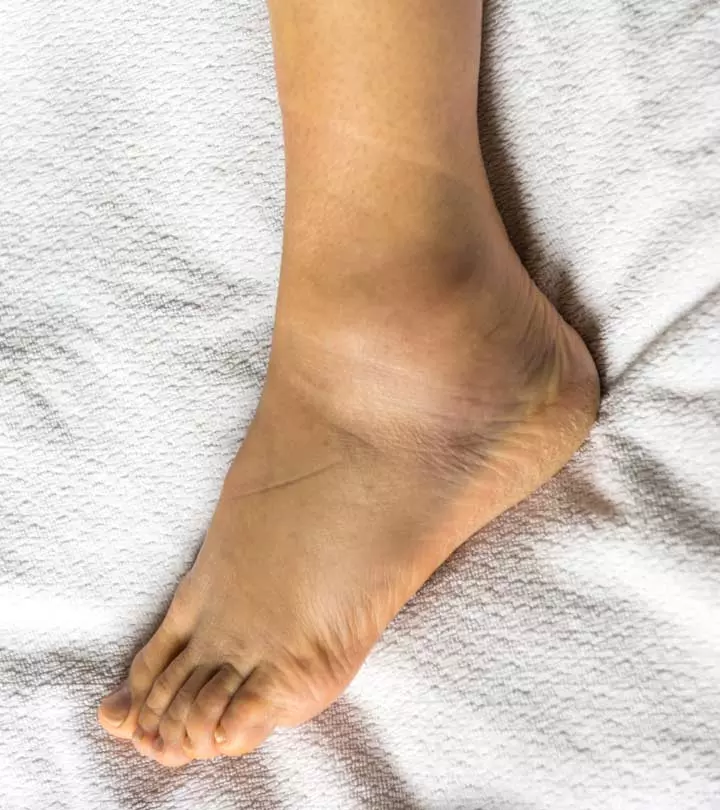
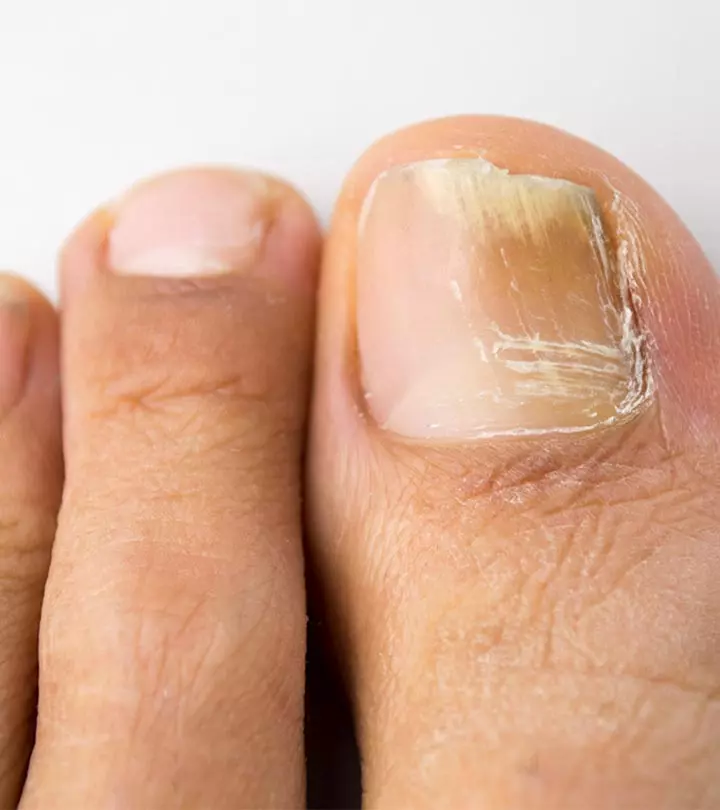

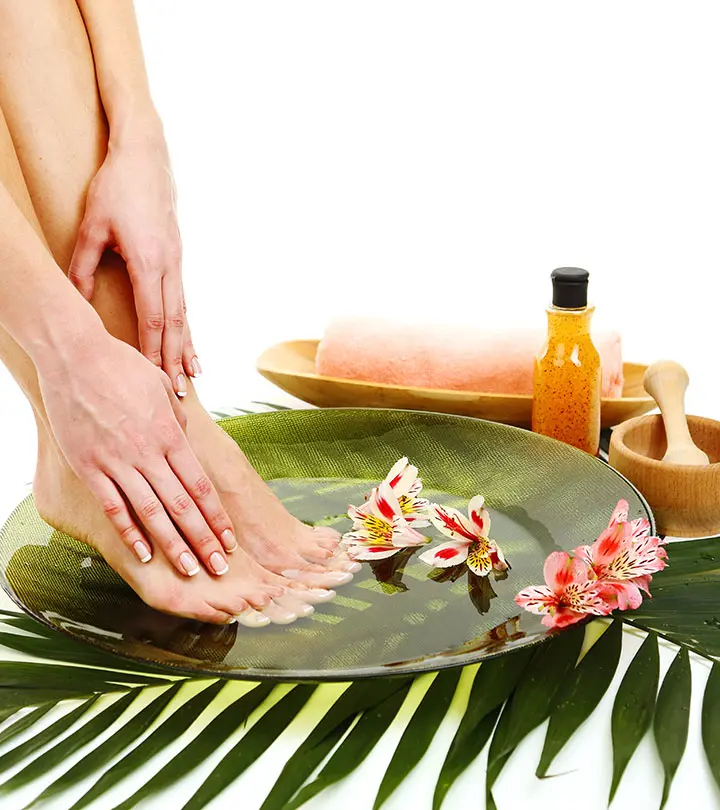
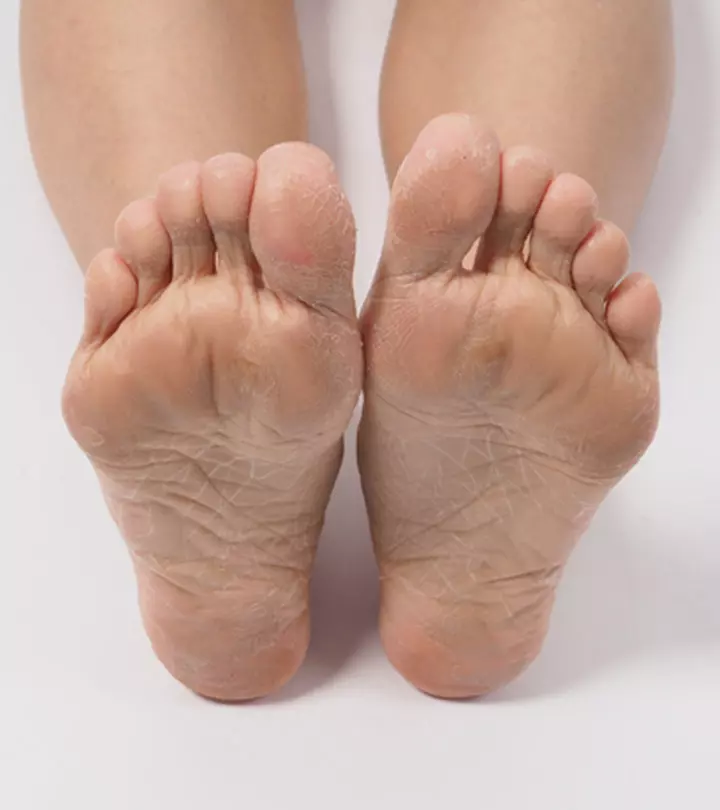












Community Experiences
Join the conversation and become a part of our empowering community! Share your stories, experiences, and insights to connect with other beauty, lifestyle, and health enthusiasts.